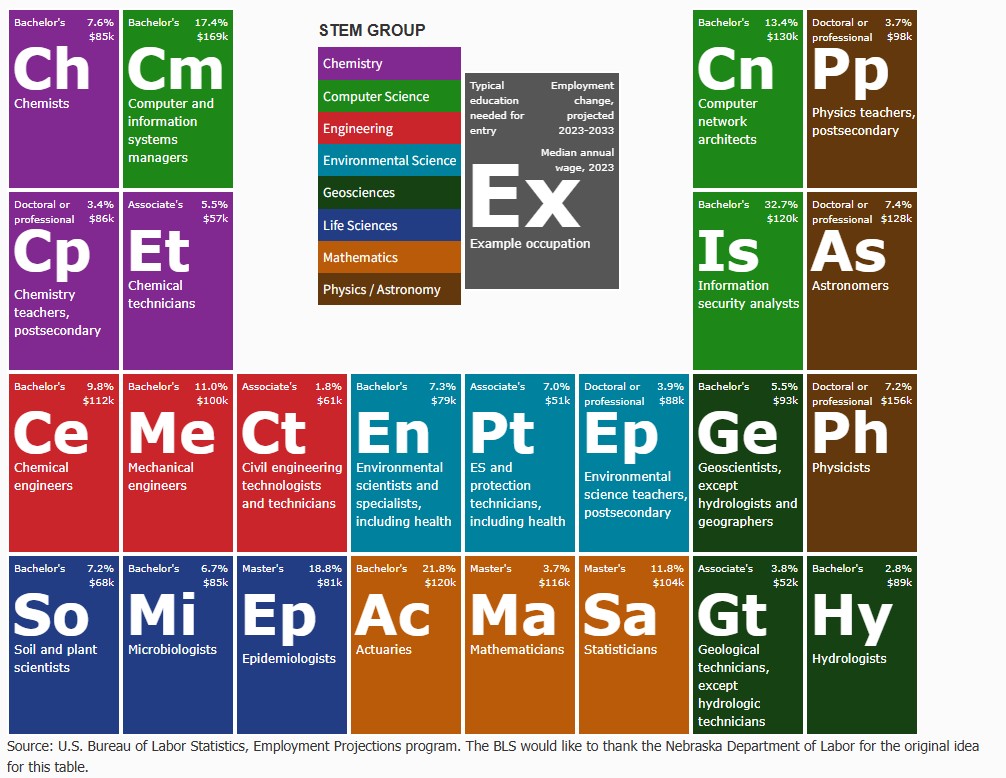
The STEM job market is evolving rapidly, offering high salaries and strong job growth for those with the right skills. Whether you’re a recent graduate or an early-career professional, choosing the right path in science, technology, engineering, or mathematics can set you up for long-term success. The U.S. Bureau of Labor Statistics (BLS) recently released a “Periodic Table of STEM Occupations,” showcasing the fastest-growing and highest-paying STEM careers through 2033.
If you’re looking for a rewarding first job in STEM, understanding where demand is rising and which careers offer the best salaries is essential. Some roles require advanced degrees, but many high-paying jobs are accessible with a bachelor’s degree. Below, we break down the best STEM careers based on growth, salary potential, and education requirements. You can download a PDF version of the table here.
“To raise new questions, new possibilities, to regard old problems from a new angle, requires creative imagination and marks real advance in science.” -Albert Einstein
Traits of a Successful STEM Professional
If you’re considering a STEM career, it’s important to assess whether you have the skills and mindset needed to succeed. Some key traits include:
- Problem-Solving Ability – STEM careers involve analyzing complex issues and developing practical solutions.
- Analytical Thinking – Many roles require interpreting data, testing hypotheses, and making data-driven decisions.
- Attention to Detail – Precision matters in fields like engineering, computer science, and laboratory research.
- Curiosity and Continuous Learning – Technology and scientific advancements evolve rapidly, requiring professionals to stay updated.
- Strong Communication Skills – Whether working in teams or presenting findings, clear communication is essential.
Top High-Growth STEM Jobs
1. Information Security Analysts – With a 32.7% job growth rate, this is the fastest-growing STEM career. Companies need cybersecurity experts to protect against rising threats. A bachelor’s degree is typically required, and the median salary is $120,360. Learn more.
2. Actuaries – These professionals, who assess financial risks, will see 21.8% job growth. Actuaries earn a median salary of $120,000 and typically need a bachelor’s degree plus certification exams. Learn more.
3. Epidemiologists – Public health remains a priority, with 18.8% job growth expected. These professionals study disease patterns and earn a median salary of $81,390. A master’s degree is required. Learn more.
STEM Jobs with the Best Salaries
1. Computer and Information Systems Managers – Tech leadership roles offer a median salary of $169,510. With 17.4% job growth, this is a lucrative field requiring a bachelor’s degree. Learn more.
2. Physicists – Those with a doctorate can earn $155,680 per year. Growth is 7.2%, making it a stable yet competitive field. Learn more.
3. Computer Network Architects – With a median salary of $129,840 and 13.4% growth, this IT career offers strong earning potential. A bachelor’s degree is typically required. Learn more.
Best STEM Careers Requiring Less than a Four-Year Degree
Not all STEM careers require a bachelor’s degree. Some of the best entry-level roles include:
- Chemical Technicians – $56,750 median salary, 5.5% growth, requires an associate’s degree. Learn more.
- Environmental Science Technicians – $50,660 median salary, 7% growth, requires an associate’s degree. Learn more.
Key Takeaways for Job Seekers
- Cybersecurity and data-driven careers are booming – Consider fields like information security or actuarial science.
- Engineering and IT roles offer high pay with a bachelor’s degree – Mechanical engineers, network architects, and information managers are in demand.
- Not all STEM careers require a four-year degree – Technicians in chemistry, geoscience, and environmental science can earn solid salaries with an associate’s degree.
Choosing a career path is a major decision, but understanding market trends helps you make an informed choice. STEM careers offer strong job security, excellent pay, and room for advancement. If you’re considering your first STEM job, focus on areas with high demand and future growth.
For more detailed job outlooks, visit the Occupational Outlook Handbook and check out the US News 20 Best STEM Careers for 2025

